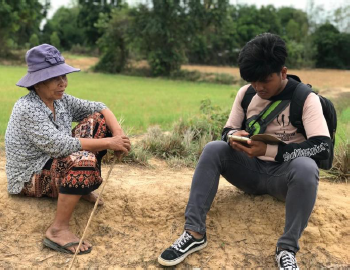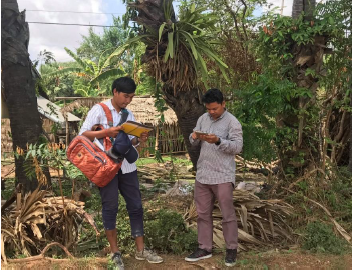|
Cycle 7 (2018 Deadline)
Climate change impact on rice yield and food security in the riverine communities in Cambodia
PI: Serey Sok (sokserey@gmail.com), Royal University of Phnom Penh
U.S. Partner: Aniruddha Ghosh, University of California, Davis
Dates: November 2018 - October 2021
Project Overview
This research project will focus on assessing impacts of climate change on rice yield leading to food insecurity in Cambodia. Climate change directly or indirectly contributes to declines in rice yield, leading to food insecurity. Vulnerability of agricultural systems to extreme climate events is often linked to the adaptive capacity of local farmers. Therefore, improving local adaptive capacity is important to sustaining the rural livelihood of riverine communities of Cambodia. The researchers conducting this project have designed it to build upon statistical and geospatial modeling techniques, using information from different sources of secondary data and field work at the national and provincial levels, especially interviews with key informants. This research will combine both conceptualization and empirical data through statistical analysis and Geographic Information Systems (GIS) to ascertain the negative impacts from climate change leading to declines in rice yields and increased food insecurity. This research will also involve interviews with local people and officials from government agencies and NGOs, an extensive literature review, and case studies.
 |  | | Team members conduct a survey in Pursat and Battambang Provinces. (Photo courtesy of Dr. Serey) |
Most previous studies focusing on Tonle Sap Lake have been conducted by regional and international organizations. While the findings are broadly reached, they do not always comprehensively fit the Cambodian context. Domestic institutions have mostly been the subjects of the project evaluations or assessments, but this study will be led by a local Cambodian academic researcher. He and his team will engage with a wide range of stakeholders, including regional and national experts, local villagers, and representatives of government agencies and NGOs at the various stages of this project. They will organize consultative meetings to facilitate interaction among the various stakeholders, present their preliminary findings, collect feedback, and discuss policy applications and future planning. This development dialogue among the stakeholders will be critical to bridging the gaps between academic research, planning, and policy implementation.
Final Summary of Project Activities
The results of this three-year project, which ended October 31, 2021, fall into three main categories: (1) publications, (2) course integration, and (3) sharing of lessons learned and best practices among practitioners. On the first, one paper (see citation below) was published in the journal Sustainability in August 2021. In it, Dr. Serey and his co-authors adopted the United Nations risk assessment framework “interaction of vulnerability factors” to assess the vulnerability of rice farmers in the Tonle Sap and the Mekong River Basin to climatic hazards in Cambodia as they tend to be aligned with disaster risks. The findings covered in the paper provide insights into the negative impacts of climate variability on riverine communities that are reliant on rain-fed rice cultivation. The study addresses a gap in the literature by contributing a comparative empirical study on the vulnerabilities of rice farmers in the Tonle Sap and the Mekong River Basin to climate variability and the adaptation and resilience strategies applied in response. Identification of attributes for the four types of the vulnerability outlined further requires a highly participatory approach involving all the key stakeholders. The authors argue that this framework is also applicable for other riverine communities in Mekong countries such as Laos, Vietnam, and Thailand, where climatic hazards are also associated with disaster risks. In addition, adaptation measures by local authorities at commune and district levels require long-term integrated water resources management approaches to mitigate these negative impacts collectively.
With regard to course integration, the PI reports that he has incorporated his experience and findings from the PEER-supported fieldwork into teaching his students at the bachelor’s, master’s, and PhD levels. In addition, a master’s student in biodiversity is using some data collected under this project for his thesis.
As for sharing lessons learned and best practices among practitioners, Dr. Serey has been invited frequently by various NGOs in Cambodia to give talks, especially online, during the COVID-19 pandemic. In late December 2021, has been invited by local NGOs to share with university students the findings of his research on the impact of climate change, adaption, and resilience in communities along the Mekong River. All of his master’s and PhD students hold positions as officials of NGOs, international organizations, and Cambodian government agencies, which has greatly facilitated sharing of the findings of this research with key stakeholders for planning and policy applications. In addition, Dr. Serey presented a paper on the impact of climate change on food security at the Mekong-U.S. Partnership Track 1.5 Policy Dialogue on October 22, 2021.
Dr. Serey and his colleagues are continuing their efforts even now that PEER support has ended. As of December 2021, they were analyzing data and writing a manuscript based on the Rural Household Multi-Indicator Surveys (RHoMIS) data they collected in Battambang, Pursat, Prey Veng, and Kompong Cham provinces. They are also writing another paper on the impact of the COVID-19 pandemic on food security in different geographical regions of Cambodia. A book chapter co-authored by the PI is also expected to appear in 2022 (see below).
Publications
Sok, S.; Chhinh, N.; Hor, S.; Nguonphan, P. Climate Change Impacts on Rice Cultivation: A Comparative Study of the Tonle Sap and Mekong River. Sustainability 2021, 13, 8979. https://doi.org/10.3390/su13168979
“Remote sensing of agriculture in South-Southeast Asia: land use and changes” in Productivity, damages, and losses of rice in Cambodia: past, present and future trends in the Mekong and Tonle Sap regions, edited by Krishna Vadrevu, Thuy Le Toan, Shibendu Shankar Ray, and Chris Justice. Springer (in press).
Back to PEER Cycle 7 Grant Recipients
|
|
|
|





